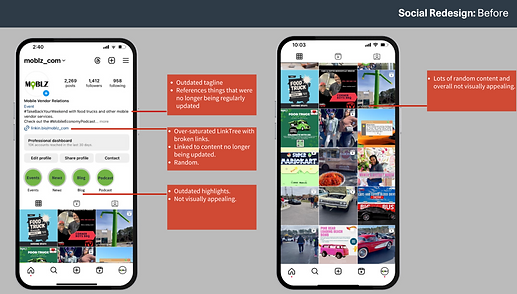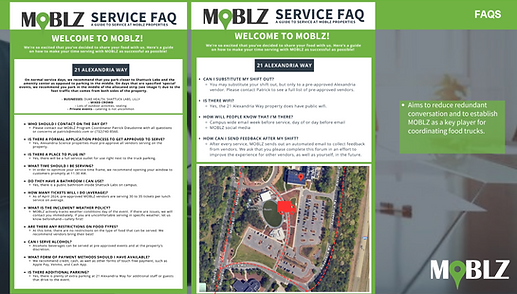MARKETING
Within my marketing career, I've focused specifically on identifying communication crises and social media marketing through data analysis and case studies.


My teammates and I worked with Matt Prince, Head of PR at Taco Bell to design a social strategy targeting Gen Z, while also enhancing transparency around Taco's Bell food quality. Prince stated the need for Taco Bell to connect with a very online, very popular, Gen Z demographic. We were given the opportunity to work together as a team to design a comprehensive media strategy to help Taco Bell most effectively reach the coveted Gen Z audience.
We curated our campaign based off of data gathered on Gen Z behavioral patterns regarding their fast food purchasing history, their perception of Taco Bell, and their online habits. Results showed that participants were both a) very likely (43%) to participate in a contest that allowed them to create their own items and b) very likely to try a new menu item if it were sponsored by an influencer (75%).
What was designed was a social media strategy by the name 'Taco Bell Fusion X You'. The Fusion X You campaign invites Taco Bell consumers to curate their own creations using Taco Bell menu items, using the hashtag '#FuseTheBell' for a chance to be featured on Taco Bell's socials. Tying in Matt Prince's desire for Taco Bell's quality ingredients to be highlighted, Fusion x You will give consumers the opportunity to get up close and personal with Taco Bell's high quality fresh ingredients by curating their own items. To generate buzz around the campaign, influencer partnerships will be utilized.
Fusion x You taps into Taco Bell's campaign goal of digital ease and innovation by allowing consumers to participate in an online contest showcasing their cuisine creativity. Doing so sheds light on Taco Bell's high quality ingredients, while also creating social and cultural relevance by use of influencers.


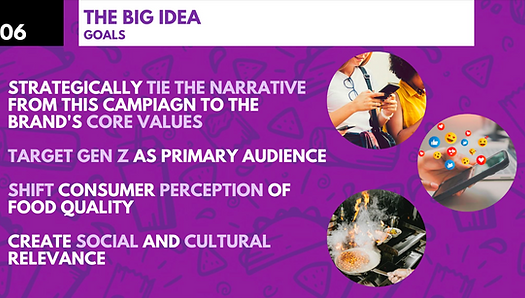
Taco Bell - Fusion x You
GATORADE - PRIDE SERIES
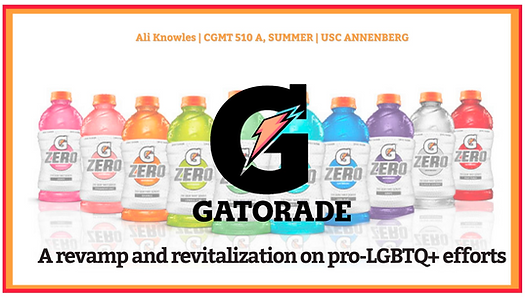
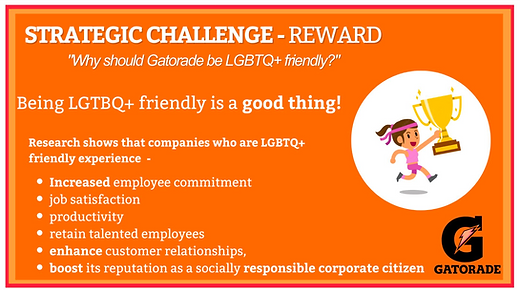



I was tasked with the assignment to revitalize a dated campaign from a company. When researching different companies, Gatorade stuck out to me. In the past, Gatorade has made efforts to identify themselves as an LBGQT+ brand, but has never truly solidified their stance on it.
Researching Gatorade's LGBTQ+ efforts proved them to be minimal and dated. In today's social landscape, consumers often gravitate towards companies that identify with their personal social values. In the year of 2025, there's been a significant increase in the concept of boycotting companies that don't reflect one's social values. In all of this, many companies are beginning to feel the pressure of corporate social responsibility: consumers are becoming pickier with where they choose to shop.
Revitalizing Gatorade's LGBTQ+ efforts would solidify their brand image as LGBTQ+ friendly. Gatorade's previous campaigns are both minimal and dated, leaving consumers to question what's authentic, and what's performative. Releasing the Pride Pack Variety Series would allow Gatorade to permanently solidify their image as LGBTQ+ friendly.
The Pride Series is a collaboration between the Regular Series and the Fierce Flavor Series, a variety pack that's often sold separately. The Pride Series would be made up of entirely pre-existing flavors and would require no further development of product aside from packaging series.
The Pride Series would be announced on June 1st, the start of Pride Month, and would be advertised by well-known LGBTQ+ athletes such as Megan Rapinoe (USWNT), Carl Nassib (NFL), and Ryan Russel (NFL). The launch would also utilize influencer marketing, working with specifically fitness and lifestyle influencers.
Finally, to truly solidify Gatorade's stance on the issue, Gatorade would partner with a number of LGBTQ+ charities to donate a portion of the proceeds.
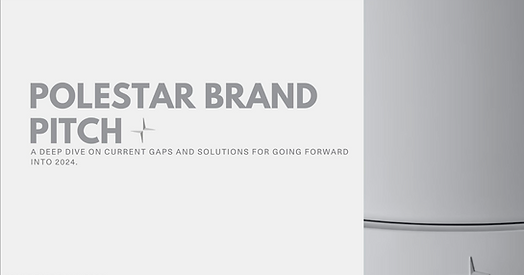

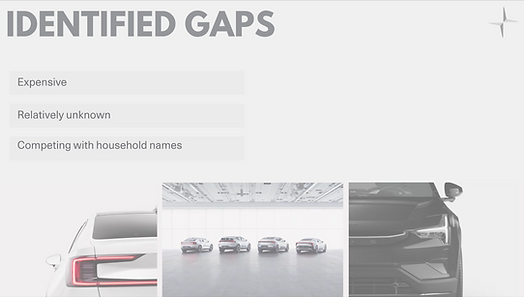
POLESTAR
My peers were assigned to a company facing a communication crisis with the hopes we would be able to identify and solve the issue of our assigned company. For the company Polestar, it was identified that the brand largely struggles with brand awareness, price tag, and competition.
As a result of these identified issues, our team designed a comprehensive media strategy for Polestar, all surrounding three main ideas: realism, exclusivity, and authenticity. The brand's strategy is realistic, based on classic marketing tactics that have proved to be efficient and effective in increasing brand exposure and awareness. Every idea put forth is obtainable and realistic. Finally, the strategy for Polestar is also authentic. Our team wants to show that Polestar is true to its brand, true to what it stands for, and will be true to its consumers and followers who choose to invest in the brand. Lastly, Polestar is the next exclusive brand. Luxury and exclusivity will work in tandem to create a brand that consumers want to have. The aspect of luxury will be enhanced as Polestar begins to roll out more exclusive events and incentives for Polestar fans and consumers.
In an effort to revitalize the Polestar brand and image, our team recommended an increase in ad spend, product placement, integration to the showrooms of Polestar's parent company, Volvo, and increased levels of community engagement.

CALIFORNIA DATING APP: GO-TO MARKET




Upon meeting California Dating App Founder and CEO, Ben Mussi, Ben immediately sought ideas to help California Dating App succeed in their go-to market strategy. Ben came to USC Master's students in the hopes of learning more about the ideal demographic for his app, as well as the best strategies for his go-to market launch.
Through extensive research, our team was able to determine the most effective age ranges to target within market launch, their preferred forms of social media, and that an in-person feature may allow California Dating App to stand out amongst household name competitors. In the process of obtaining our results, our team conducted focus groups, surveys, and collected extensive research on dating apps, dating app patterns, social media behavior, and data pertaining to specific age groups.
Analyzing data collected from the Pew Research Center, our team was able to determine that Ben's ideal target age demographic was going to be the 18-29, 56-64, and 65+ age groups. Additionally, we were able to conclude that young men (18-29) are much more likely to be single in comparison to young women (18-29). In order to further reach Ben's ideal demographic, we were also able to cite research that confirmed that the most used social apps are currently Facebook and Instagram. These two apps, our team recommended, would be ideal for Ben to utilize for advertising.
Through survey methods and data analysis, our team was able to conclude that an 'In-Person' feature would overwhelmingly set California Dating App apart from other apps. Our data concluded that safety is top concern for women on dating apps. The feature would advertise internally on the app, and would allow couples to meet potential matches in safe, regulated environments. Our team concluded that the 'In-Person' feature could aid largely in driving user-engagement and traffic to the app.
MOBLZ: SOCIAL REDESIGN
In my previous role as the Social Media Content Creator for MOBLZ, my primary goal was to provide clarity and transparency to our brand through the use of social media. The MOBLZ model, to those who are unfamiliar with it, is confusing due to the various groups of people that MOBLZ caters to.
MOBLZ is both a B2B and B2C model. MOBLZ works with both small and large businesses. On the small business scale, MOBLZ works directly with small businesses and food trucks to connect them to business parks, where they can be booked for events. MOBLZ works with these business parks by securing contracts, in which the MOBLZ responsibility is to curate and host events. The concept of MOBLZ stems from the idea of providing incentives for employees to return to the office. MOBLZ is marketed as an amenity service for business parks to advertise to their tenants and employees within the parks.
The B2C aspect is introduced by MOBLZ actively working to curate events and book food trucks that employees will enjoy. In the event that MOBLZ does not nurture this B2C aspect, attendance in events may drop, and contracts between MOBLZ and business park clients may not be renewed.
Given the confusing nature of this nontraditional business model, as the social media content creator, I wanted to bring clarity to anyone who may not truly understand MOBLZ. I spearheaded this initiative by redesigning our social media. This was done by first, creating a content calendar, which provided structure for myself and allowed my peers to see what I was working on at the time. I strategically posted on the MOBLZ social account, dividing social posts between highlighting events, small businesses, and advertising website features.
Internally, I designed a Frequently Asked Questions Packet regarding every location that MOBLZ works with to be sent to vendors and food trucks that are being stationed at those locations. These FAQs provided information regarding parking, Wi-Fi, insurance, and more. This reduced redundant conversations, and provided transparency between MOBLZ and vendors.
